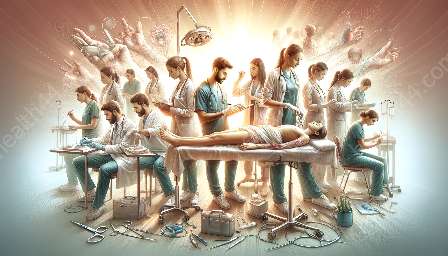Understanding laboratory tests and procedures is vital in the field of healthcare, playing a crucial role in clinical skills training, health education, and medical training. These tests and procedures provide valuable insight into a patient's health status and aid in the diagnosis and management of various medical conditions. In this comprehensive guide, we will explore the world of laboratory tests and procedures, covering different types of tests, sample collection, and interpretation of results.
The Importance of Laboratory Tests and Procedures in Clinical Skills Training
Laboratory tests and procedures are an integral part of clinical skills training for healthcare professionals. By understanding the principles behind various tests and procedures, clinicians develop the expertise needed to collect samples accurately, perform tests effectively, and interpret results with precision. This hands-on experience is essential for building the necessary skills and confidence to provide quality patient care.
Types of Laboratory Tests and Procedures
There are numerous types of laboratory tests and procedures, each serving a specific purpose in diagnosing, monitoring, and managing diseases. Some common types include:
- Blood Tests: These tests analyze blood samples to assess various parameters such as blood cell counts, cholesterol levels, and glucose levels.
- Urinalysis: This test examines the physical and chemical properties of urine and is often used to detect urinary tract infections, kidney disorders, and other health conditions.
- Imaging Studies: Procedures like X-rays, CT scans, and MRIs are essential for visualizing internal structures and identifying abnormalities within the body.
- Biopsy: A biopsy involves the removal of a small tissue sample for microscopic examination, aiding in the diagnosis of cancer and other diseases.
- Genetic Testing: This type of testing assesses an individual's genetic makeup and predisposition to inherited diseases.
Sample Collection and Handling
Accurate sample collection and proper handling are critical aspects of laboratory tests and procedures. Healthcare professionals need to adhere to standardized protocols to ensure the integrity of samples and the reliability of test results. For instance, blood samples must be collected using aseptic techniques and stored at the appropriate temperatures to prevent sample degradation.
Interpretation of Results
Once the samples are processed, the interpretation of results becomes a crucial step in the diagnostic process. Clinicians need to possess the knowledge and skills to analyze test results accurately and understand their implications for patient care. This involves correlating the findings with the patient's clinical history and other diagnostic information to arrive at an accurate diagnosis.
Integrating Laboratory Tests and Procedures into Health Education and Medical Training
In addition to their role in clinical skills training, laboratory tests and procedures form an integral part of health education and medical training programs. A comprehensive understanding of these tests is essential for medical students, nurses, and other healthcare professionals. It equips them with the knowledge required to make informed decisions regarding patient care and treatment.
The Practical Application of Laboratory Tests in Patient Care
Health education and medical training emphasize the practical application of laboratory tests in patient care. Students learn to recognize the significance of various test results and its impact on patient management. This knowledge allows them to interpret test results in the context of a patient's overall health, aiding in the formulation of appropriate treatment plans.
Using Laboratory Tests as Diagnostic Tools
Medical training programs focus on using laboratory tests as diagnostic tools to identify and monitor diseases. Students are taught to select the most appropriate tests based on clinical indications and interpret the results to support their clinical decision-making process.
Building Competency in Test Procedures
Health education and medical training aim to build competency in performing test procedures accurately and efficiently. Students undergo practical training to master the skills required for sample collection, test administration, and result interpretation, preparing them for their future roles as healthcare providers.
In Conclusion
Laboratory tests and procedures are indispensable components of healthcare, playing a vital role in clinical skills training, health education, and medical training. By delving into the world of laboratory testing, healthcare professionals gain the necessary expertise to offer effective patient care, make informed clinical decisions, and contribute to the advancement of medical knowledge and treatment methods.



